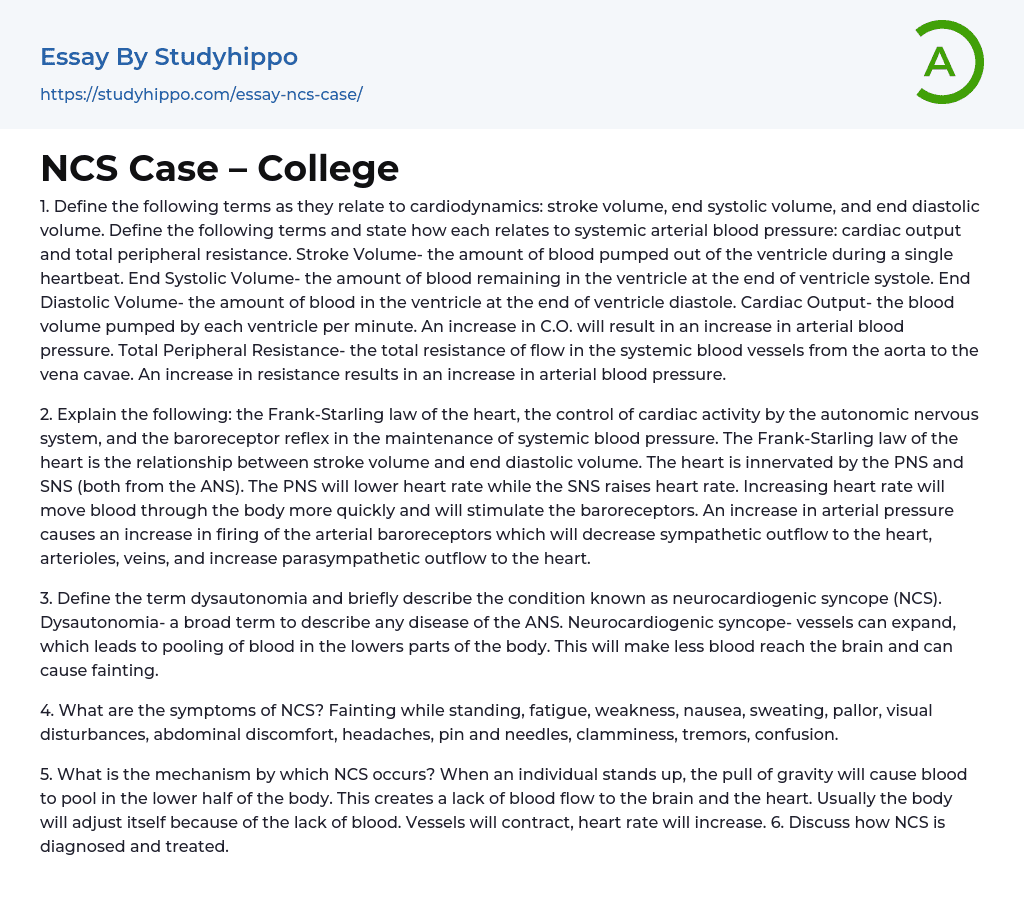1. Define the following terms as they relate to cardiodynamics: stroke volume, end systolic volume, and end diastolic volume. Define the following terms and state how each relates to systemic arterial blood pressure: cardiac output and total peripheral resistance. Stroke Volume- the amount of blood pumped out of the ventricle during a single heartbeat. End Systolic Volume- the amount of blood remaining in the ventricle at the end of ventricle systole. End Diastolic Volume- the amount of blood in the ventricle at the end of ventricle diastole. Cardiac Output- the blood volume pumped by each ventricle per minute. An increase in C.O. will result in an increase in arterial blood pressure. Total Peripheral Resistance- the total resistance of flow in the systemic blood vessels from the aorta to the vena cavae. An increase in resistance results in an increase in arter
...ial blood pressure.
2. Explain the following: the Frank-Starling law of the heart, the control of cardiac activity by the autonomic nervous system, and the baroreceptor reflex in the maintenance of systemic blood pressure. The Frank-Starling law of the heart is the relationship between stroke volume and end diastolic volume. The heart is innervated by the PNS and SNS (both from the ANS). The PNS will lower heart rate while the SNS raises heart rate. Increasing heart rate will move blood through the body more quickly and will stimulate the baroreceptors. An increase in arterial pressure causes an increase in firing of the arterial baroreceptors which will decrease sympathetic outflow to the heart, arterioles, veins, and increase parasympathetic outflow to the heart.
3. Define the term dysautonomia and briefly describe th
condition known as neurocardiogenic syncope (NCS). Dysautonomia- a broad term to describe any disease of the ANS. Neurocardiogenic syncope- vessels can expand, which leads to pooling of blood in the lowers parts of the body. This will make less blood reach the brain and can cause fainting.
4. What are the symptoms of NCS? Fainting while standing, fatigue, weakness, nausea, sweating, pallor, visual disturbances, abdominal discomfort, headaches, pin and needles, clamminess, tremors, confusion.
5. What is the mechanism by which NCS occurs? When an individual stands up, the pull of gravity will cause blood to pool in the lower half of the body. This creates a lack of blood flow to the brain and the heart. Usually the body will adjust itself because of the lack of blood. Vessels will contract, heart rate will increase. 6. Discuss how NCS is diagnosed and treated.
- Professor essays
- Should College be Free essays
- Should college athletes be paid essays
- College Education essays
- College Tuition essays
- Graduation essays
- College Goals essays
- Personal Statement essays
- Online Classes Vs Traditional Classes essays
- Online Education essays
- Student Loan essays
- Study Abroad Scholarship essays
- Reasons To Go To College essays
- Paying College Athletes essays
- Technology In The Classroom essays
- Cloning essays
- Medical Ethics essays
- Patient essays
- Therapy essays
- drugs essays
- Cannabis essays
- Aspirin essays
- Cardiology essays
- Hemoglobin essays
- Pharmacology essays
- Surgery essays
- alternative medicine essays
- Plastic Surgery essays
- Organ Donation essays
- Vaccines essays
- Medical essays
- Dentist essays
- Psychological Trauma essays
- Physical therapy essays
- Cold essays
- Cocaine essays
- Why Marijuana Should Be Legalized essays
- Drug Abuse essays
- Teenage Drug Abuse essays
- Heart Disease essays
- Artery essays
- Classroom essays
- College essays
- E-Learning essays
- Elementary School essays
- Examination essays
- Graduate School essays
- High School essays
- History Of Education essays
- Homeschooling essays




